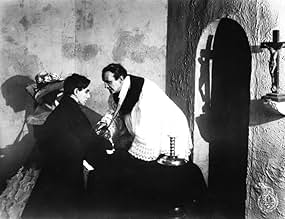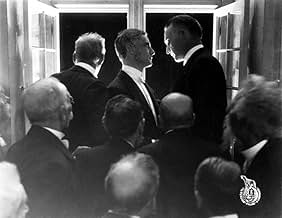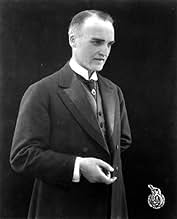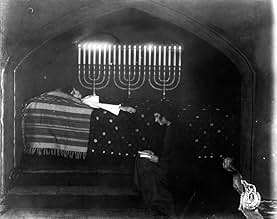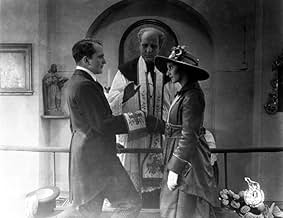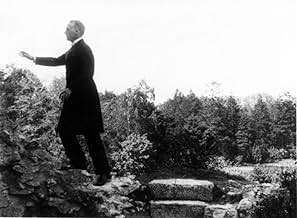Præsidenten
- 1919
- 1h 25m
ÉVALUATION IMDb
6,6/10
1,1 k
MA NOTE
Ajouter une intrigue dans votre langueA judge sees his illegitimate daughter facing a trial for the murder of her newborn child, also out of wedlock. He is certain that she will be sentenced to death.A judge sees his illegitimate daughter facing a trial for the murder of her newborn child, also out of wedlock. He is certain that she will be sentenced to death.A judge sees his illegitimate daughter facing a trial for the murder of her newborn child, also out of wedlock. He is certain that she will be sentenced to death.
- Director
- Writers
- Stars
Carl Walther Meyer
- Rigsherre von Sendlingen
- (as Carl Meyer)
Avis en vedette
Carl Theodor Dreyer had a history as a writer, and it shows in his first feature film as a director, The President. There's a literary aspect to the production that emphasizes character and structure that gives the film's final resolution a surprising amount of satisfaction. However, being the first film of a filmmaker so early in the history of cinema, there's a roughness and simplicity to a lot of the production that ends up feeling a bit like a drag, especially from certain moments in performance. It's a surprisingly solid first effort from the former reporter.
The film is the story of really three generations of male failure regarding women. It starts with a prologue as the elder and aristocratic von Sendlingen takes his adult son, Karl Victor, on a walk through their ruined castle and tells him the tale of how he married his mother. She was the daughter of a servant that he wooed and impregnated, eventually trying to run away from his responsibilities before Karl Victor's grandfather made von Sendlingen marry the girl. For, he says, a von Sendlingen may mess up from time to time, but they can never be a villain. The lesson to the self-described wretch von Sendlingen is that Karl Victor must never marry a commoner.
Skip ahead thirty years, and Karl Victor is the president of a tribunal (essentially a public defender, it seems) in his small Danish town. He's an incredibly well-respected member of the community, well on his way up to bigger and better things. He's presented with a case in his professional capacity that affects him deeply, though. This is a moment where the amateurish acting leaps off the screen, as Elith Pio, as Karl Victor, throws himself around in torment for his internal qualms. It feels wrong, histrionic, and overbearing. Anyway, the issue is that his illegitimate daughter, Victorine, has been arrested for murdering her baby.
One of the interesting things about the film is that it's built around a series of flashbacks. The first was von Senglingen telling of his time as a youth that led to his marriage. The second is Karl Victor describing to his friend, Georg Berger, how he fell for Victorine's mother, his cousins' governess, but backed away from marrying her because of the promise he made to his father. Their daughter, conceived illegitimately, ended up as Victorine, a girl who struggled to survive just like her mother, eventually becoming the governess to a harsh mistress. Her story of falling in love with her mistress's son. When she became pregnant, the son cowardly went away for months and wrote the truth to his mother who kicked Victorine out of the house in the middle of the night. Now, it's a bit unclear, probably for taste reasons, how Victorine went from struggling alone in the dark of night to collapsed on the ground with her dead child next to her, but I assume she had a premature birth that ended with her child dying. It's never said or shown, but I believe that's what happened. I think this effort to tastefully present something ugly probably goes a bit too far to the point where it's simply unclear what actually happened.
The tribunal splits almost evenly, deciding that Victorine does deserve death for her crimes despite Georg Berger's impassioned defense of the situations of the crime. This is where the movie gets really interesting.
Karl Victor is torn by all of this. If he had accepted Victorine's mother, Victorine would never have been put into that situation. He could have protected her. He even refused to protect her in his official capacity as president of the tribunal. His dual loyalties to his illegitimate daughter and to justice and in conflict within him, and he decides that he must break the law when he learns that a plea for clemency gets denied. He decides that he's going to break her out of prison and find a way to give her the life he denied her.
There's something wonderful in how this plays out. There's a dinner in celebration of Karl Victor's great history as a justice before he is to move on to another post, a dinner that he leaves early to break Victorine out of prison. He gets her away, gives her away to a man at a wedding out in the country (who this man is ends up never terribly well explained, a small issue with the finale since he's not really the point), and goes back to the village for punishment which ends up denied for his actions, if made public, would raise questions about the sanctity of justice in the people.
So, there's some stuff holding the film back. The acting doesn't gel all the time. There are interesting designs on walls that contrast with the otherwise spare look, but I don't think they mean anything (I could very well be wrong about that, by the way). The husband to Victorine at the end just shows up, is described as a plantation owner, and has no other characterization. A lot of framing is pretty mundane, silent film stuff. However, there's a lot to really enjoy. There's obvious talent on display with something to say about the plight of women and the responsibilities of men. There are individual shots that are quite striking (like a shot of von Sendlingen and his commoner mistress on a small boat on a river that stays in my mind). I have a feeling that this Carl Th. Dreyer person may have some more good movies in him.
The film is the story of really three generations of male failure regarding women. It starts with a prologue as the elder and aristocratic von Sendlingen takes his adult son, Karl Victor, on a walk through their ruined castle and tells him the tale of how he married his mother. She was the daughter of a servant that he wooed and impregnated, eventually trying to run away from his responsibilities before Karl Victor's grandfather made von Sendlingen marry the girl. For, he says, a von Sendlingen may mess up from time to time, but they can never be a villain. The lesson to the self-described wretch von Sendlingen is that Karl Victor must never marry a commoner.
Skip ahead thirty years, and Karl Victor is the president of a tribunal (essentially a public defender, it seems) in his small Danish town. He's an incredibly well-respected member of the community, well on his way up to bigger and better things. He's presented with a case in his professional capacity that affects him deeply, though. This is a moment where the amateurish acting leaps off the screen, as Elith Pio, as Karl Victor, throws himself around in torment for his internal qualms. It feels wrong, histrionic, and overbearing. Anyway, the issue is that his illegitimate daughter, Victorine, has been arrested for murdering her baby.
One of the interesting things about the film is that it's built around a series of flashbacks. The first was von Senglingen telling of his time as a youth that led to his marriage. The second is Karl Victor describing to his friend, Georg Berger, how he fell for Victorine's mother, his cousins' governess, but backed away from marrying her because of the promise he made to his father. Their daughter, conceived illegitimately, ended up as Victorine, a girl who struggled to survive just like her mother, eventually becoming the governess to a harsh mistress. Her story of falling in love with her mistress's son. When she became pregnant, the son cowardly went away for months and wrote the truth to his mother who kicked Victorine out of the house in the middle of the night. Now, it's a bit unclear, probably for taste reasons, how Victorine went from struggling alone in the dark of night to collapsed on the ground with her dead child next to her, but I assume she had a premature birth that ended with her child dying. It's never said or shown, but I believe that's what happened. I think this effort to tastefully present something ugly probably goes a bit too far to the point where it's simply unclear what actually happened.
The tribunal splits almost evenly, deciding that Victorine does deserve death for her crimes despite Georg Berger's impassioned defense of the situations of the crime. This is where the movie gets really interesting.
Karl Victor is torn by all of this. If he had accepted Victorine's mother, Victorine would never have been put into that situation. He could have protected her. He even refused to protect her in his official capacity as president of the tribunal. His dual loyalties to his illegitimate daughter and to justice and in conflict within him, and he decides that he must break the law when he learns that a plea for clemency gets denied. He decides that he's going to break her out of prison and find a way to give her the life he denied her.
There's something wonderful in how this plays out. There's a dinner in celebration of Karl Victor's great history as a justice before he is to move on to another post, a dinner that he leaves early to break Victorine out of prison. He gets her away, gives her away to a man at a wedding out in the country (who this man is ends up never terribly well explained, a small issue with the finale since he's not really the point), and goes back to the village for punishment which ends up denied for his actions, if made public, would raise questions about the sanctity of justice in the people.
So, there's some stuff holding the film back. The acting doesn't gel all the time. There are interesting designs on walls that contrast with the otherwise spare look, but I don't think they mean anything (I could very well be wrong about that, by the way). The husband to Victorine at the end just shows up, is described as a plantation owner, and has no other characterization. A lot of framing is pretty mundane, silent film stuff. However, there's a lot to really enjoy. There's obvious talent on display with something to say about the plight of women and the responsibilities of men. There are individual shots that are quite striking (like a shot of von Sendlingen and his commoner mistress on a small boat on a river that stays in my mind). I have a feeling that this Carl Th. Dreyer person may have some more good movies in him.
Praesidenten is a film about the crucial conflict between the (conservative) codes of society and individual moral.
It tells the story of a grandfather, father and son of a well respected family who all make the same mistake and fall in love with a common girl.
They all have to resolve the problem in a way acceptable to the society they live in but must consequently suffer the inner guilt that inevitably follows.
Finally, late in his life the son, whose a respected judge in a small town, gets a chance to redeem himself and his ancestors by doing the right thing morally but also severely breaking the law in doing so.
This highlights the conflict between the personal and the societal spheres of right and wrong in a spectacular way, especially as Dreyer depicts the other local men of power as only concerned with how the incident would affect their status in society.
Dreyer uses flashback- structure in a very efficient and economical way to build the comparisons between the different times portrayed in the film. Furthermore: in this our digital age of fast editing and overflow of image it is most gratifying to see a film that has a complex point to make and manages to do that almost effortlessly with a minimum of "hassle". The direction is so economic it almost hides the mastery of cinematic vision behind it to the untrained eye.
It tells the story of a grandfather, father and son of a well respected family who all make the same mistake and fall in love with a common girl.
They all have to resolve the problem in a way acceptable to the society they live in but must consequently suffer the inner guilt that inevitably follows.
Finally, late in his life the son, whose a respected judge in a small town, gets a chance to redeem himself and his ancestors by doing the right thing morally but also severely breaking the law in doing so.
This highlights the conflict between the personal and the societal spheres of right and wrong in a spectacular way, especially as Dreyer depicts the other local men of power as only concerned with how the incident would affect their status in society.
Dreyer uses flashback- structure in a very efficient and economical way to build the comparisons between the different times portrayed in the film. Furthermore: in this our digital age of fast editing and overflow of image it is most gratifying to see a film that has a complex point to make and manages to do that almost effortlessly with a minimum of "hassle". The direction is so economic it almost hides the mastery of cinematic vision behind it to the untrained eye.
Dreyer is one of my favorite directors and his debut is one of the best debuts I've seen. The story is captivating, sometimes pretty brutal. Genuine tear-jerker.
Nice camera work, great musical score. A must-watch for fans of silent movies.
Nice camera work, great musical score. A must-watch for fans of silent movies.
Dreyer himself was a child born out of wedlock and given to adoption by an unwed woman who died soon thereafter. No wonder the sufferings of a woman are the marrow of many of his films.
The Danish woman is widely considered to be a rather high-spirited and free-minded creature. There are several films in the series issued by the Danish Film Intitute which show how women take things in their own hands, choose their men, inflict revenge upon them. But that is not the case in Præsidenten. This is a full blown melodrama about the constant sufferings of women, generation after generation. A pretty outdated concept by 1919 standards, and a pretty moralizing version of the eternal story of men taking advantage of women, having their way with them and abandoning them. There's a lot of honor and duty involved int the style of a proper Gilbert and Sullivan operetta, but unlike G&S, the film takes itself much too seriously. There are some highly unmotivated actions and a very, very weird scene, that seems to be either totally butchered or else the Danes lacked the knowledge of how babies are born completely - the barely pregnant governess is driven into the night, she collapses in the woods... and the next morning she is found lying there with the dead child by her side! So naturally she is blamed with infanticide at once. I don't know how exactly, but I find it hard to believe that reproduction worked like that. There's also a lot of bad make-up as all the young men also play themselves in their ripe years, so overall the results aren't very convincing. A somewhat tedious production, but worthy a viewing.
The Danish woman is widely considered to be a rather high-spirited and free-minded creature. There are several films in the series issued by the Danish Film Intitute which show how women take things in their own hands, choose their men, inflict revenge upon them. But that is not the case in Præsidenten. This is a full blown melodrama about the constant sufferings of women, generation after generation. A pretty outdated concept by 1919 standards, and a pretty moralizing version of the eternal story of men taking advantage of women, having their way with them and abandoning them. There's a lot of honor and duty involved int the style of a proper Gilbert and Sullivan operetta, but unlike G&S, the film takes itself much too seriously. There are some highly unmotivated actions and a very, very weird scene, that seems to be either totally butchered or else the Danes lacked the knowledge of how babies are born completely - the barely pregnant governess is driven into the night, she collapses in the woods... and the next morning she is found lying there with the dead child by her side! So naturally she is blamed with infanticide at once. I don't know how exactly, but I find it hard to believe that reproduction worked like that. There's also a lot of bad make-up as all the young men also play themselves in their ripe years, so overall the results aren't very convincing. A somewhat tedious production, but worthy a viewing.
This film is very interesting for various reasons. I will here look briefly at its style, which was explicitly made by Dreyer (confirmed in a letter to Erik Ulrichsen 11th March 1958, now in the Danish Film Museum) to make the interiors reflect the characters. For this, he modeled the sets after paintings by Vilhelm Hammershøi and James Whistler. This is very apparent if one looks at Whistler's portrait of his Mother against a gray wall, and the many Hammershøi paintings where he balances the model(s) also against gray, cool blue or white walls decorated with a few small portraits strictly arranged. I would also like to add that a lot of the white faces and hands, which Dreyer often frames in almost complete darkness, reminds me of how the graphic work by Edvard Munch can make any face look like a premature death mask. There is certainly in this film much interplay between the Nordic darkness of the soul and the barren interiors of the late aristocracy. These arrangements make the film appear as a well thought out study of how to balance painterly and cinematographic style. However, many of these carefully constructed scenes are very short. I would assume that longer takes would make for a very much more beautiful and contemplative film, but alas it would also slow down the hectic and melodramatic plot, which just gets more frantic with each scene, ending in a tour de force of cross cutting a la Griffith. So in a way the plot kills the style. Oh well.
The current version was created in 1999 from the original nitrate negative and released on DVD in 2004 by the Danish Film Institute. It is tinted in amber, blue and red. Compared with film stills I have seen in black and white, the DVD looks very dark. For example the scene when Karl Victor reads the letter informing him that it is his daughter that will be prosecuted for infanticide, the wallpaper behind him is completely obscured, making the white passepartout framing the portrait on the wall shine in the darkness. In the still of the same scene you can clearly see the pattern in the wallpaper around the picture, making the whole scene more naturally lighted. Since the lightning in the film as a whole is full of dark imagery, this loss of detail makes the film look more expressionistic and gloomy than originally intended. Of course, that might only make it more interesting for fans of Nosferatu, Vampyr and other Gothic nightmares. But Præsidenten is not a Gothic tale, but rather a moral melodrama typical of its time, with echoes of Ibsen, Strindberg and Söderberg (writer of Gertrud). But as seen in the current version, it certainly looks Gothic - and some might find its charm just because of that.
The current version was created in 1999 from the original nitrate negative and released on DVD in 2004 by the Danish Film Institute. It is tinted in amber, blue and red. Compared with film stills I have seen in black and white, the DVD looks very dark. For example the scene when Karl Victor reads the letter informing him that it is his daughter that will be prosecuted for infanticide, the wallpaper behind him is completely obscured, making the white passepartout framing the portrait on the wall shine in the darkness. In the still of the same scene you can clearly see the pattern in the wallpaper around the picture, making the whole scene more naturally lighted. Since the lightning in the film as a whole is full of dark imagery, this loss of detail makes the film look more expressionistic and gloomy than originally intended. Of course, that might only make it more interesting for fans of Nosferatu, Vampyr and other Gothic nightmares. But Præsidenten is not a Gothic tale, but rather a moral melodrama typical of its time, with echoes of Ibsen, Strindberg and Söderberg (writer of Gertrud). But as seen in the current version, it certainly looks Gothic - and some might find its charm just because of that.
Le saviez-vous
Meilleurs choix
Connectez-vous pour évaluer et surveiller les recommandations personnalisées
Détails
- Durée
- 1h 25m(85 min)
- Mixage
- Rapport de forme
- 1.33 : 1
Contribuer à cette page
Suggérer une modification ou ajouter du contenu manquant

